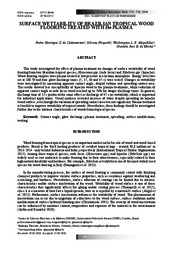Surface wettability of Brazilian tropical wood flooring treated with He plasma.
Surface wettability of Brazilian tropical wood flooring treated with He plasma.
Author(s): CADEMARTORI, P. H. G. de; NISGOSKI, S.; MAGALHAES, W. L. E.; BOLZON DE MUNIZ, G. I.
Summary: This study investigated the effect of plasma treatment on changes of surface wettability of wood flooring from two Brazilian tropical species, Hymenaea spp. (rode locus) and Tabebuia spp. (lapacho). Wood flooring samples were plasma treated at low pressure in a helium atmosphere. Energy level was set at 100 W and four glow discharge times (5, 15, 30 and 45 s) were tested. Changes in wettability were investigated by measuring apparent contact angle, droplet volume and spreading contact area. The results showed less susceptibility of lapacho wood to the plasma treatments, while reduction of apparent contact angle in rode locus wood reached up to 76% for longer discharge times. In general, discharge time of 15 s produced the same effect as discharge of 45 s on wettability, which is important for industrial applications. Visual analyses revealed increase of water droplet spreading on lapacho wood surface, even though the variation of spreading contact area was not significant. Plasma treatment is feasible to improve wettability of tropical woods. Nevertheless, these findings should be investigated further due to the intrinsic characteristics of woods from tropical species.
Publication year: 2016
Types of publication: Journal article
Unit: Embrapa Forestry
Observation
Some of Embrapa's publications are published as ePub files. To read them, use or download one of the following free software options to your computer or mobile device. Android: Google Play Books; IOS: iBooks; Windows and Linux: Calibre.
Access other publications
Access the Agricultural Research Database (BDPA) to consult Embrapa's full library collection and records.
Visit Embrapa Bookstore to purchase books and other publications sold by Embrapa.

